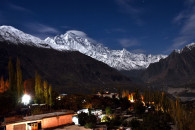Mega drug bust: Cleared in Islamabad, caught in Karachi
Shipment bound for Europe via West Africa had blessings of Islamabad customs and ANF staff; probe, inquiries ordered.

Corrupt practices continue to plague national institutions as the country’s premier drug control agency busted a plot by its own officers to smuggle more than three tons of hashish out of the country.
The matter came to the attention of the Anti Narcotics Force (ANF) after they confiscated 3.1 tons of high-quality hashish at Karachi Port.
The hashish was stored in 200 bags of rice that had been sealed and cleared for export by ANF officials at Islamabad Dry Port. The consignment, which was destined for West Africa, was only checked because some ANF officers at Karachi Port suspected foul play in its handling, particularly after ANF officials in Islamabad requested to have the consignment released, according to sources in Karachi.
A thorough inspection revealed that the bags contained 3.1 tons of hashish, with a street value of hundreds of millions of rupees. The ANF suspects that the consignment was destined for Europe via the West African state of Guinea-Bissau, a popular transhipment point for illegal drugs.
Initial evidence points to an ANF inspector and Pakistan Customs deputy collector, both of whom are posted at the Islamabad Dry Port facility in Sector I-9.
Senior dry port officials, asking not to be named, said they will spare no effort to bring the culprits to justice, and the authorities will fully cooperate with the investigation team.
Sources in Karachi revealed that ANF authorities in Islamabad unsuccessfully attempted to influence the release of the consignment for Guinea-Bissao.
The incident has sent shock waves through the bureaucratic ranks as Federal Board of Revenue Chairperson Salman Siddique ordered the formulation of a high-level inquiry committee to investigate the role of Customs officials.
ANF officials called the bust “one of the biggest and most significant in the agency’s history”.
Pakistan has long been the preferred route to smuggle $4 billion worth of Afghanistan’s biggest export, heroin, into Europe. Hashish, like heroin and opium, is usually smuggled into the country through the porous north-western border on live animals.
Cannabis and opium poppy are Afghanistan’s primary cash crops, accounting for well over half of the country’s Gross Domestic Product, and their cultivation has gone largely unchecked due to the instability in the region and the protection afforded to the growers by the Taliban and warlords, depending on the grower’s location.
Published in The Express Tribune, September 11th, 2011.



















COMMENTS
Comments are moderated and generally will be posted if they are on-topic and not abusive.
For more information, please see our Comments FAQ